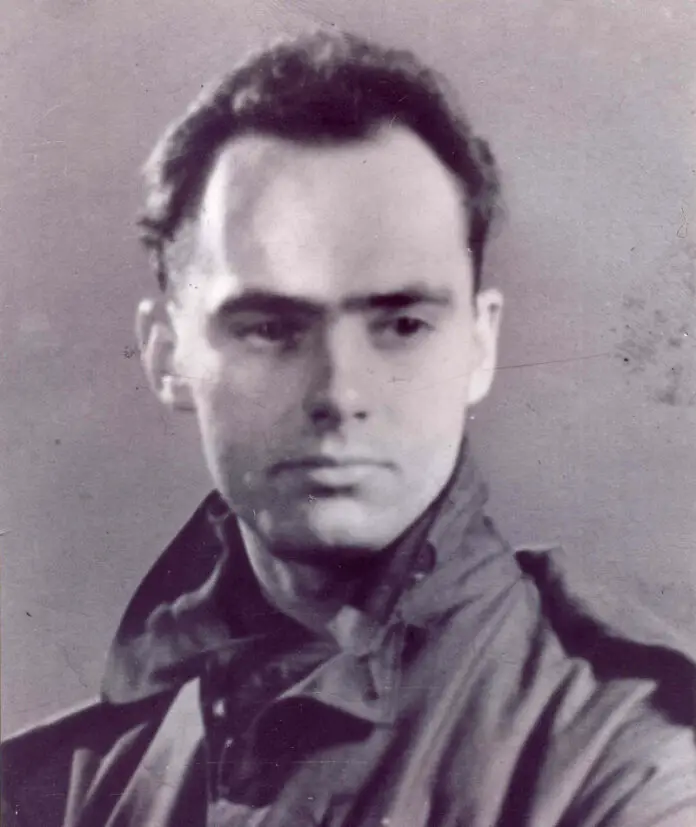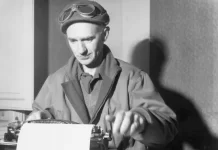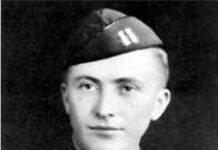Sergeant Nelson Vogel Brittin was not content sighting in one war for his country. When he came out of World War II unharmed, the Audubon, New Jersey native stayed overseas, probably in Italy where he had served with the US Army and studied at the University of Florence.
When he came back to his hometown a few months later, he re-enlisted in the Army and was sent to Japan with post-war occupation forces. From there he was stationed in Korea to teach English to youngsters there.
Korea
That is where he was in 1950 when the Korean war broke out, and Brittin was in the midst of it. He was part of the 3rd Battalion, 19th Infantry of the 24th Infantry Division and was injured in battle twice, once in December 1950 and a second time in February of the following year. Two months after that, he was killed in Yonggon-Ni in north-central South Korea.
Born Oct. 21, 1920, one of four sons and four daughters of Wesley and Anna Brittin, Nelson was drafted four years after his 1938 graduation from Audubon High School, served in Italy and was discharged in 1946 after the second world war ended.
Reflections
M/Sgt. Charles Willeford, USAF, who attended mandatory Troop Information classes at the Clifford Theater in Korkura, Japan when Brittin was assigned there as an instructor, described him as the kind of soldier who did not make a deep impression at first. But when he spoke in the lecture hall, Willeford said, “you didn’t remember what he said, but remembered rather the way he said them. And that he said it all very well.”
He described the soldier as about five feet, seven inches tall, and weighing “about 130 pounds with a rock in each hand.” But he continued, in a military newspaper article he wrote, “his movements were quick and he had the wiry toughness of the well-trained infantryman who is kept in shape in spite of himself.
He wore G.I. glasses, and what little hair he had left was cropped to less than an inch. His right arm was much longer than his left. When he walked, springing along on the balls of his feet, he leaned forward, his arms swinging hardly at all.”
While Brittin was lecturing during that information hour, Willeford said in response to another soldier asking who Brittin was, “I don’t know him, but nobody sneaks out of the lectures at the break anymore.” Not because he was such a great speaker, he said, but because “He doesn’t allow it, and if you’re caught, you’ve had it.”
The airman met up with Brittin after that, and worked with him when he was station manager for WLKR, the Armed Forces Radio Station covering the island of Kyushu, and the 24th Division Armed Forces Radio was under the supervision of the I & E Section, where Brittin was chief clerk. Once orders changed, the two never met up again.
On March 7, 1951, Brittin was with Company I in Yonggong-Ni in north-central South Korea. Now a sergeant first class, he volunteered to lead his squad up a hill. There wasn’t much cover to protect them from intense enemy fire, so Brittin asked his squad mates to cover him while he moved forward and tossed a grenade at the nearest enemy position.
Sgt. Brittin’s body was returned to the United States in November 1951. His Medal of Honor was presented to his parents by Defense Secretary Robert Lovett on Jan. 16, 1952, during a Pentagon ceremony. Nine other fallen soldiers also received the nation’s highest honor that day.
Citation
For conspicuous gallantry and intrepidity above and beyond the call of duty while serving with Company I, 3d Battalion, 19th Infantry Regiment, 24th Infantry Division, in action against enemy aggressor forces at Yonggong-in, Korea on 7 March 1951.
Volunteering to lead his squad up a hill, with meager cover against murderous fire from the enemy, Sergeant First Class BRITTIN ordered his squad to give him support and, in the face of withering fire and bursting shells, he tossed a grenade at the nearest enemy position. On returning to his squad, he was knocked down and wounded by an enemy grenade. Refusing medical attention, he replenished his supply of grenades and returned, hurling grenades into hostile positions and shooting the enemy as they fled.
When his weapon jammed, he leaped without hesitation into a foxhole and killed the occupants with his bayonet and the butt of his rifle. He continued to wipe out foxholes and, noting that his squad had been pinned down, he rushed to the rear of a machinegun position, threw a grenade into the nest, and ran around to its front, where he killed all three occupants with his rifle. Less than 100 yards up the hill, his squad again came under vicious fire from another camouflaged, sandbagged, machinegun nest well-flanked by supporting riflemen. Sergeant First Class BRITTIN again charged this new position in an aggressive endeavor to silence this remaining obstacle and ran direct into a burst of automatic fire which killed him instantly. In his sustained and driving action, he had killed 20 enemy soldiers and destroyed four automatic weapons.
The conspicuous courage, consummate valor, and noble self-sacrifice displayed by Sergeant First Class BRITTIN enabled his inspired company to attain its objective and reflect the highest glory on himself and the heroic traditions of the military service.
Additional Honors
This recipient of Congressional Medal also received the Combat Infantryman Badge with Star (denoting 2nd award) . the Purple Heart, Army Good Conduct Medal, World War II Victory Medal, National Defense Service Medal, Korean Service Medal with 1 Campaign star, United Nations Korea Medal and the Korean War Service Medal.
Sgt. Brittin, is buried in Beverly National Cemetery in Beverly, New Jersey.
In addition to the monument at Audubon High School honoring the three Congressional Medal of Honor residents of the borough, Sgt. Brittin is also honored by the Audubon VFW Post, and the Army Reserve Center in Camden both named in his honor. The Navy‘s sealift ship, the USNS Brittin, which has been in service since 2002, was named for him as well.



